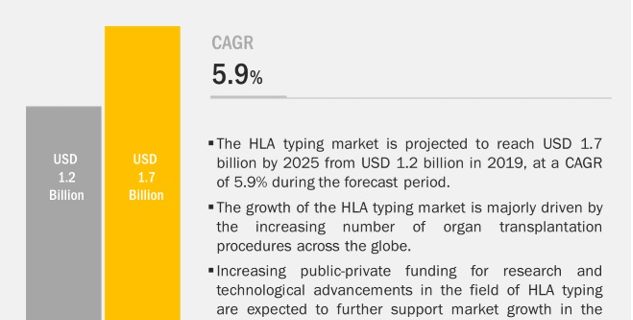
Growth in the HLA typing market is mainly driven by factors such as the increasing number of HLA typing procedures conducted, technological advancements in the field of HLA typing, and increasing funding for research.
The global HLA typing market is projected to reach USD 1.7 billion by 2025 from USD 1.2 billion in 2019, at a CAGR of 5.9%. However, the high costs of HLA typing products and limited reimbursements for target procedures are expected to restrain market growth in the coming years. Along with this, the significant supply-demand gap between the number of organ donors and organs required annually is expected to challenge market growth to a certain extent.
By product and service, reagents & consumables accounted for the largest market share in 2019.
On the basis of product & service, the HLA typing market has been segmented into reagents & consumables, instruments, and software & services. The reagents & consumables segment accounted for the largest share of the HLA typing market in 2019. The segment is expected to register the highest growth in the same year. Factors such as the growing application horizons of molecular assay techniques in HLA typing, increasing patient emphasis on effective and early patient profiling during organ transplantation, the growing adoption of molecular diagnostic techniques in research studies, and the rising number of target procedures across major markets are driving the growth of this segment.
Download PDF Brochure @
https://www.marketsandmarkets.com/pdfdownloadNew.asp?id=39129877
Based on technology, the molecular assay technologies segment accounted for the largest share in 2019.
On the basis of technology, the HLA typing market is segmented into molecular and non-molecular assay technologies. The molecular assay technologies segment accounted for the largest share of the HLA typing market in 2019. The growth of this segment is attributed to their benefits over non-molecular assays, such as low turnaround times, high procedural efficacy, multi-sample study capabilities, and real-time sample analysis.
The diagnostic applications segment will continue to dominate the HLA typing market in 2025.
On the basis of application, the market is segmented into diagnostic and research applications. The diagnostic applications segment dominated the HLA typing market in 2018. This is attributed to technological advancements in molecular assay techniques, the increasing adoption of molecular assay procedures for pathogen encounter detection and histocompatibility cross-matching, and the growing incidence of chronic and infectious diseases.
The commercial service providers segment accounted for the largest share of the HLA typing market in 2019.
On the basis of end user, the market is segmented into commercial service providers, hospitals & surgical centers, and research laboratories & academic institutes. In 2019, the commercial service providers segment accounted for the largest share of the HLA typing market due to the rapid modernization and adoption of automation in HLA typing, growing outsourcing of R&D activities to said providers, and the increasing consolidation of diagnostic laboratories.
Request for Sample Pages @
https://www.marketsandmarkets.com/requestsampleNew.asp?id=39129877
The market in the Asia Pacific is expected to grow at the highest CAGR during the forecast period.
The market is segmented into five major regions, namely, North America, Europe, Asia Pacific, Latin America, and the Middle East and Africa. The Asia Pacific market is estimated to grow at the highest CAGR during the forecast period, primarily due to the improving healthcare infrastructure, rising awareness, improving reimbursement scenario, and the growing insurance coverage in several APAC countries.
Leading Companies
Thermo Fisher Scientific Inc. (US), Bio-Rad Laboratories, Inc. (US), F. Hoffman-La Roche Ltd. (Switzerland), QIAGEN N.V. (Netherlands), Illumina, Inc. (US), Immucor, Inc. (US), CareDx (US), Becton, Dickinson and Company (US), Hologic (US), GenDx (Netherlands), and Biofortuna (UK) are the players in this market.

